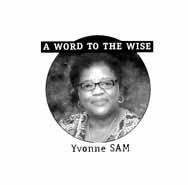 As violence begets violence, what kind of notes are they taking…
As violence begets violence, what kind of notes are they taking…
America has always been regarded as the world’s television. No matter what time you tune in, or on what channel, she always has something going on that will seize your attention and unravel your moral fiber and cause you to question your very being.
Be it lynching, hangings, segregation, water-hosing, police attack dogs, marches, protests, bombings, sit-ins, walk-outs, space try-outs, debates, updates, marching bands or angry Klans, lootings or shootings in churches, cinemas or schools…there’s never a shortage of activity on the screen.
Now that there is some semblance of calm following the recent deadly attack on law enforcement representatives, some lingering questions remain to ponder long and hard. And although they do not demand immediate answers they must be addressed, as they are determinants for the future.
One would be hard-pressed today to find a child who does not have a Smartphone and access to computers, so that there is no information that can be hidden from them.
Yes, they can upload at will the video of Alton Sterling’s shooting by Baton Rouge Police, and also Philando Castile with the hole in his chest, the victim of skilled Minnesota police marksmanship. The officer, having shot him in the car, but missed his fiancé and her 4-year-old daughter, passengers in the same car who witnessed the bloody ordeal.
As adults, are we paying attention to the children in this trying time of the nation’s history? Beware, the children are taking notes; there is an adage that goes thus: “Children are sponges, soaking up every verbal and nonverbal interaction.”
Has anyone, especially parents, taken the time to find out his or her reactions to the battle zone that the world has become? How has all this bloodshed the world over: killing of innocent children in Munich, beheading of the priest in Normandy, slaughter of innocent disabled citizens in Japan, the police shootings and the recent shootings of police impacted them?
We should, as parents, be concerned not only with what they say but also with what they are not saying.
If we should fail to assist the children in processing what is taking place in the world and their immediate environment, then sad to say the horror happening now will seem tame in comparison to what will take place in the future.
Now is the time to sit down and talk to the children. It is not what they know, or how much they know, but what is written or etched in their minds. What kind of notes are they taking?
This is an extremely trying time the world over, but especially in America, a return to the darkest moments, but if we leave our children to their own perceptions, they may as a result formulate their own impression that no one cares.
In the hell that the world is becoming, it is not only the adults that have been hurt and are hurting, but the children too.
In America, children have been privy to their peers being senselessly killed by the police, with impunity.
Over time, it’s inevitable that children will have less and less respect for the law, police officers as well as the legal system and eventually contemplate taking matters into their own hands as evidenced by the deadly rampage against law enforcement officers by Gavin Long in Louisiana and Micah Xavier Johnson in Texas.
It is worth considering what would be the state of the world, especially America, in the not-too-distant future when this emotionally traumatized, violence-numbed generation is in control.
We must now turn our attention to the children as they try to make some sense of the toxic environment around them, and conduct forums big or small, giving an opportunity to listen to each one and all.
The home is the ideal starting point, where parents must take the time to sit down with their children and help them process what is taking place the world over. Or else we should start fearing for the future.
The writing is already on the wall.
(This article was published in part in the Montreal Gazette on Saturday, July 30)















